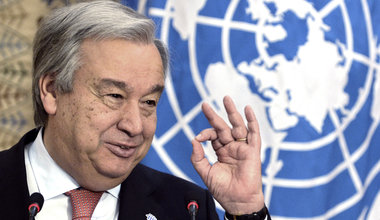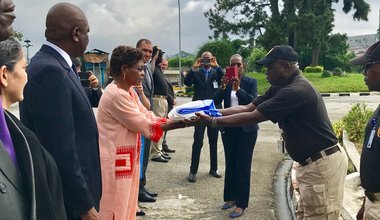PRESS REVIEW FOR WEDNESDAY, 28 AVRIL 2010
UNOCI visits Tiémé this
morning
L'Intelligent d'Abidjan -
Tiémé in
Odienné Prefecture is hosting UNOCI Days this morning. The three-day event will
involve among other things, free medical consultations and the institution's
weekly press conference.
Odienné: social cohesion in
electoral period. UNOCI trains civil society and Media
Le Jour Plus -
The United Nations Operation in Côte d'Ivoire (UNOCI) on Tuesday started a
workshop on "The role of local media and civil society in the reinforcement of
social cohesion in electoral period in Denguélé region" in Odienné, 862 km from
Abidjan. Forty participants from the districts of Odienné, Boundiali and
Tengréla will attend the working session which is like a forum for two days.
Opening the session, Paul Jatho, UNOCI's focal point in Odienné, reminded
participants of the workshop's importance, the 9th of its kind
organized by the UN mission and whose objective, as with previous ones, is the
capacity building of the members of civil society and media, with a view to
promoting social cohesion for a peaceful electoral environment. The First
Secretary-General of the Prefect's Office of Odienné, Dindet Konin, said that
this public activity of UNOCI for the next electoral consultations is the
mission's best guarantee for peace and its commitment to do everything to regain
peace in Côte d'Ivoire. The official also said he would like the results of the
workshop to consolidate social cohesion. (...)
Re-launching the peace
process. Civil society's proposals to the IEC. Youssouf Bakayoko: «It is
difficult to give a date »
L'Inter-
Four major organizations of
the Ivorian civil society, namely COSOPCI, WANEP-CI, FOSCAO-CI and COFEMCI-REPC
on Wednesday 21 April 2010 met the IEC's Chairman to discuss the resumption of
the electoral process and the partnership between civil society and the IEC (...).
They advised the IEC to "make the mobility of the IEC Commissioners effective in
order to resolve the issue of difficult access to localities; reinforcing the
population's sensitization with regard to appeals on the electoral list
particularly in remote places; moving the court closer to the applicants;
increasing centres for appeals process; reinforcing sensitization by involving
community leaders in order that the phase of complaints and appeals is a genuine
success". These civil society organizations asked the team led by Youssouf
Bakayoko to organize the presidential election on the basis of the achievements
made so far namely the provisional electoral list. They also proposed the
implementation of a working team including the IEC, civil society, UNDP to work
on the electoral process in order to better organize civic education for the
population, sensitization and electoral observation. Finally, COSOPCI, WANEP-CI,
COFEMCI-REPC and FOSCAO-CI outlined the need to organize a 15-day information
and sensitization campaign before the next phases of the electoral process. (...)
Chairman Bakayoko said that his institution was ready to maintain relations with
the civil society, and added that he continued to work to find the method to
make the electoral process move forward. "It is difficult to give a date and set
a timetable without having completed the resolution of the definitive electoral
list", he said, adding that the electoral list called the white list will be
reviewed.
Emmanuel Assi's Contribution / electoral list - Do not get the wrong appeals
Le Patriote
- While the appeal process is
pending, "prosecutors" and "supporters" of the electoral list are engaged in a
fierce battle. While the first are in favour of the review (audit) of the
electoral list, the second are against. What "judge of peace" could reconcile
them around the rule of law! The law states that the electoral list is an
"administrative document" on which only Ivorian nationals - from birth or
adoption - with the capacity to vote are registered. Therefore, this list is not
an open list to any comer, but a document of the administration, in this case,
the National Institute of Statistics (INS), assisted by the National Office for
Identification (ONI) and the National Commission for the Supervision of
Identification (CNSI), with the technical assistance of Sagem Security.
Registration is an individual act. However, it does not make the registered a
voter. Rather the registered derived from the cross-checking of "past records"
of the administration. From this operation, (...) INS and Sagem security, praised
for having "done a great and serious work by producing a reliable and credible
list, purged of all fraud" (Fraternite-Matin October 5, 2009), provided the
provisional electoral list of 5300. 586 voters (...)
Before
the march of the RHDP on May 15: Tagro summons the Rjdp this morning
Le
Nouveau Réveil
–Desire Tagro, the Minister of Interior and the State Security
in Côte d'Ivoire will meet, this morning at his office in the Plateau, with the
leaders of the Rally of the Youth for Democracy and Peace (Rjdp). The summon was
made by the Minister Desire Tagro himself. The day before yesterday, Mr. Tagro
called Kouadio Konan Bertin (KKB), the chairman of the youth of the PDCI-RDA, on
his way back from Korhogo to Abidjan. During this meeting, the Minister of
Interior and the opposition youth will certainly discuss the current
socio-political issues, particularly the march on May 15. After their meeting
with Desire Tagro today, KKB of the JPDCI. Karamoko Yayoro of the RJR, Yao
Seraphin of the JUDPCI and Diomonde Noel of MFA will meet with officials from
the national police tomorrow.
Aboudrahamane Sangare (Vice-Chairman of the FPI): "The RHDP is preparing a
rebellion"
Le
Nouveau Réveil -
Vice-President of the FPI, he is also a master piece of the regime of Laurent
Gbagbo. As, at once he decides to break the silence, he analyzes the national
political situation, including the celebration of freedom of the FPI. (...)
Can we
celebrate freedom and democracy in a country, when the government of this
country prevents a section of the population from demonstrating, when soldiers
shoot at Ivorians who want the elections with real bullets?
Aboudrahamane Sangare:
Listen, if we consider the recent political situation, we will
retain three demonstrations of "the opposition parties". Two of them were
insurrections. The first insurrection occurred on March 25, 2004. That day, the
opposition amalgamated with the rebellion in a union called the G7 called for a
demonstration, to demand according to them the full implementation of the
Marcoussis Agreement. (...) In reality, the unspoken goal of this march was to
allow the rebellion into Abidjan and carry out a coup. (..)
What
is the second event?
Aboudrahamane Sangare:
The second insurgency was launched after the dissolution of the
Independent Electoral Commission (IEC) and the Government on February, 12, 2010.
Djedje Mady, the spokesperson of the opposition asked his supporters not to
recognize President Gbagbo as the President of the Republic and to compel him to
leave office "by all means." The youth of the RHDP, thus followed the
instructions of the first leader of their parties. They burned, broke and
destroyed public buildings and private properties. (...) The opposition "lights
the fire and then shouted there is fire". This strategy is known in political
sociology. People cry there is a wolf while in reality they are the wolves
themselves. It is evil to use corpses as a strategy of the conquest of power.
(...)
 ONU
ONU Nations Unies Maintien de la paix
Nations Unies Maintien de la paix



